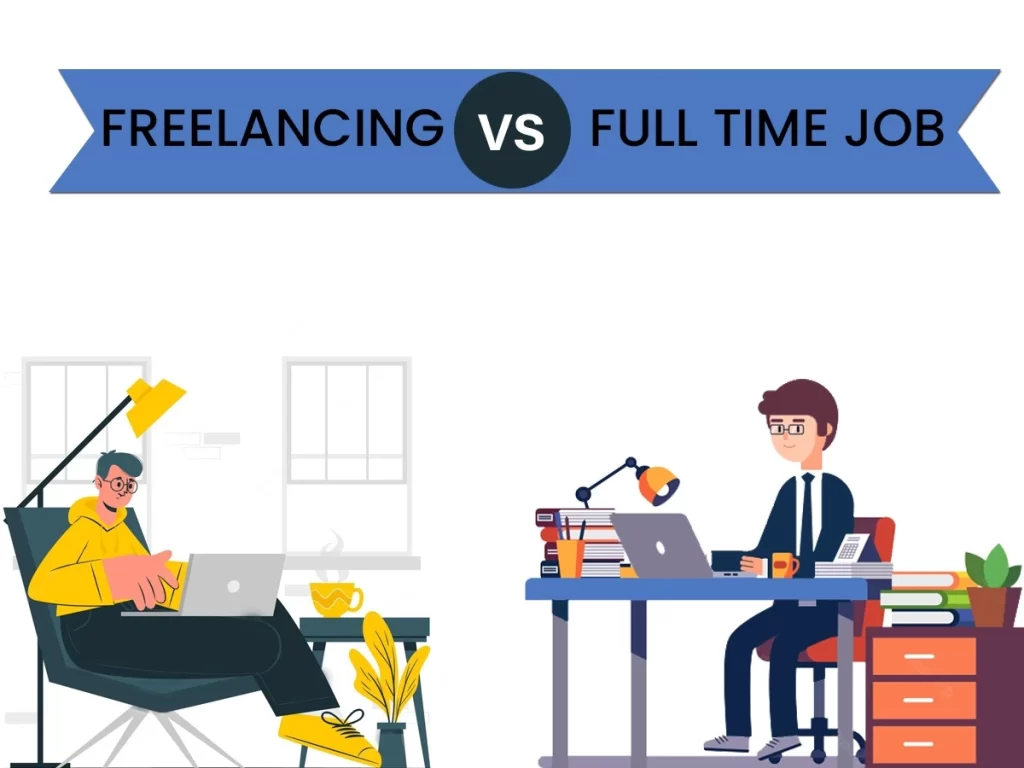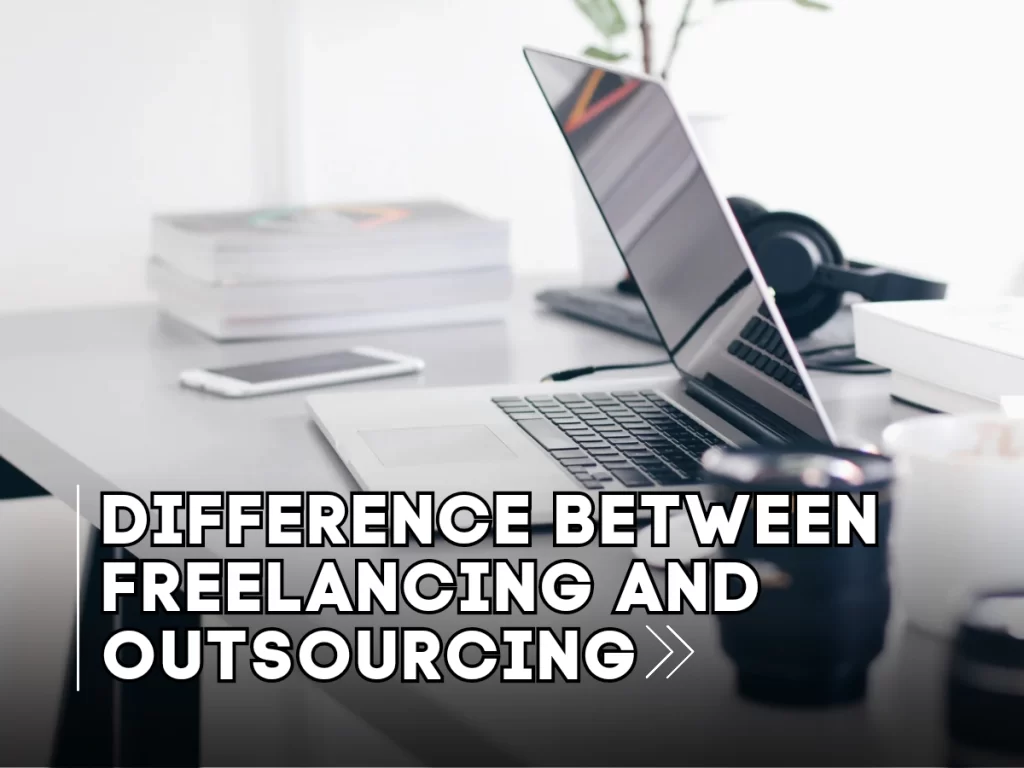The debate on freelancing vs full time job has become critical. Because people seek a better work-life balance and financial stability.
Full-time jobs offer a steady income, benefits, and a clear career path. While freelancing provides:
- Flexibility.
- Multitasking ability.
- The potential to earn a higher income.
Work has changed significantly in recent years since the rise of the gig economy. People are more interested in freelancing than jobs.
Quick Overview:
“Freelancing offers more flexibility. A full-time job provides more security and stability regarding a regular paycheck and benefits.”
In this article, we’ll explore the key differences between freelancing and jobs and the advantages and disadvantages of each option.
Let’s Dive Into Satisfying Your Soul: What Should You Choose?
The positives of freelancing are having a flexible schedule and working from any location. This freedom can be significant for those who value work-life balance. They need to take care of children or family members. And have other commitments that require a flexible schedule.
The positives of full-time jobs are that they offer stability and predictability. With a full-time job, employees typically have a set schedule. They receive a steady paycheck, providing financial security and peace of mind.
Career Growth:
Regarding career growth, freelancing can offer faster opportunities for growth compared to traditional full-time jobs. Freelancers can take on multiple projects and clients, leading to a diverse portfolio and increased experience.
In addition, freelancers have the potential to earn a higher income compared to full-time jobs.
Instability & Unpredictability:
Freelancing can be unpredictable and unstable compared to a full-time job, as projects may come and go. In this case, income may be different.
Full-time jobs provide a more stable source of income. But employees may feel constrained by a fixed schedule and limited opportunities for professional growth.
Flexibility & Ease of work
When it comes to freelancing, the more flexibility it offers. Freelancers can work when and where they want as long as they meet their client’s deadlines. It can be particularly beneficial for those with family responsibilities. And for those who enjoy having control over their schedule.
Jobs, on the other hand, typically require employees to work set hours and be in a specific location. At the same time, some companies do offer flexibility in terms of working hours. It is, however, more of an exception than a rule.
Income Stability
One of the most significant disadvantages of freelancing is the need for more income stability. Freelancers rely on securing contracts and projects to generate income, which can be unpredictable. They may also experience periods where they have no work at all.
Jobs, on the other hand, typically offer a more stable income. Employees receive regular salaries and benefits and can often count on job security if they perform well.
Control Over Work
Freelancers have much more control over the type of work they do than employees do. The projects they take on are up to them. Freelancers can tailor their work which suits their interests and skills.
In contrast, employees are often given tasks and responsibilities determined by their employer. At the same time, they may have some input into their work. While they generally have less control over their day-to-day tasks than freelancers do.
Benefits
Jobs generally offer employees a range of benefits. Such as health insurance, they are paid vacation time and retirement plans. On the other hand, freelancers are responsible for sourcing and paying for their benefits.
While freelancers can deduct the cost of their benefits from their taxes, this can still be a significant expense that cuts into their income. However, freelancers do have the advantage of being able to choose their benefits rather than being limited to what their employer offers.
Work-Life Balance
Freelancers often report having a better work-life balance than employees. They have more control over their schedule and can often fit work around other commitments. It comes to caring for children or pursuing hobbies.
However, freelancers can also find it difficult to switch off from work as they are responsible for managing their workload and meeting their clients’ deadlines.
On the other hand, employees often struggle to achieve a work-life balance due to long hours and a rigid work schedule. However, they also have the advantage of switching off from work when they leave the office.
Networking
Freelancers rely heavily on networking and building relationships with clients to secure work. They need to market themselves effectively and build a strong reputation in their industry.
On the other hand, employees often have more networking opportunities within their company. They may also have access to professional development opportunities and training. It will help them build their skills and expand their professional network.
Strengths and Weakness Of Freelancing and Full-Time Job
Strengths Of Freelancing
Flexibility: Freelancers have complete control over their schedules. That means they can choose to work when they want and take time off when needed. It can be particularly beneficial for those with family responsibilities. And for those who want to pursue other interests outside of work.
Variety of Work: Freelancers have the opportunity to work on a variety of projects which can keep their work exciting and challenging. They can also work with clients who align with their personal or professional values, making their work more meaningful.
Control over Workload: Freelancers have complete control over the type and amount of work they do. That means they can choose to take on fewer projects during busy periods. They can take on more work when they need to generate additional income.
Higher Earning Potential: Freelancers often have higher earning potential than employees. Because they can charge higher rates for their services and have more control over their workload.
Weakness of Freelancing
Lack of Stability: Freelancers have no guaranteed income and
may experience periods when they have no work. They are also responsible for sourcing their clients and generating their income.
Lack of Job Security: Freelancers need job security and may find securing work during difficult economic times challenging.
Strengths of Jobs
Stable Income: Jobs offer employees a stable income and job security. Which provides peace of mind and financial stability.
Benefits: There are many benefits associated with jobs. Such as health insurance, they are paid vacation time and retirement plans.
Professional Development Opportunities: Jobs often offer professional development opportunities and training. It can help employees expand their skills and advance their careers.
Networking Opportunities: Jobs allow employees to network within their company and industry. It can lead to new opportunities and career growth.
Weakness Of Job:
Lack of Flexibility: Jobs often require employees to adhere to a fixed schedule, making balancing work and personal commitments difficult. Depending on the company’s policies, it may also be challenging to take time off or work remotely.
Limited Control Over Work: Employees may have less control over their day-to-day tasks and responsibilities than freelancers. They may also be subject to office politics and a rigid hierarchy, making it difficult to innovate or make changes.
Limited Opportunities for Skill Development: Depending on the company culture and industry, employees may need more skills development and career advancement opportunities. They may also need to be more expensive in the projects or tasks they can work on, which can stifle creativity and professional growth.
Office Politics: Jobs often involve working with colleagues and managers, leading to office politics and interpersonal conflicts. It can make work environments stressful and unproductive and may ultimately lead to burnout.
Less Work-Life Balance: Employees may need more work to achieve a work-life balance due to long hours and a rigid work schedule. That can make pursuing personal interests or spending time with family and friends challenging.
My Verdict on Freelancing vs Full Time Job:
Focusing on the advantages and disadvantages of freelancing and jobs is essential.
While jobs offer stability and benefits, they may also come with limitations on flexibility and control over work. Freelancing offers flexibility and, in the current situation, may generate high income rather than a job.
Ultimately, it’s up to you to determine which option aligns best with your personal and professional goals.
FAQs
How do the working hours and schedules differ between freelancing and full-time jobs?
The working hours and schedules for freelancing and full-time jobs can differ.
Full-time jobs usually involve a set schedule, with specific work hours and days of the week predetermined by the employer.
On the other hand, freelancers can work whenever they want and are not bound to a fixed schedule.
Another difference between freelancing and full-time jobs is that freelancers can work remotely, while full-time jobs typically require employees to work on-site.
A freelancer can work from anywhere with an internet connection, while full-time employees must commute to their workplace.
Can Freelancing Offer a Better Work-Life Balance Than a Full-Time Job?
Freelancing offers more flexibility and the potential for a better work-life balance than a traditional full-time job. Freelancing is the ability to set your schedule and work from anywhere.
It allows for greater control over your time and the potential to better balance work with other aspects of your life: hobbies, family, and personal obligations.
On the other hand, full-time jobs often require a set schedule and location, making managing other aspects of your life difficult. Commuting and adhering to strict work hours can lead to less flexibility and feeling tied down to the job.
Also, full-time jobs may have more demanding workloads and expectations, making maintaining a healthy work-life balance harder.
Conclusion: Which is Best? Freelancing or Full-Time Job:
Which is the best choice – freelancing or a full-time job? The answer ultimately depends on your circumstances and priorities.
Freelancing may be your best choice if you value flexibility and control over your work. And the ability to tailor your career to your interests and skills.
However, be prepared for more stability and the need to market yourself constantly and seek out new clients.
A job may be better if you prioritize stability, a regular salary, and benefits. Remember that you may have less control over your work and may be subject to a rigid schedule and hierarchy.
Ultimately, deciding to freelance or work full-time depends on individual preferences and priorities.
Those who value flexibility, independence, and the potential for higher income may prefer freelancing, while those who prioritise stability, predictability, and benefits may prefer a full-time job. It is essential to consider both options’ pros and cons before deciding.
If you find the content on freelancing vs full time job helpful, share this content with others to help them make a better decision.





